
Émilie Chauchoin, professionally known as Claudette Colbert, was an American actress. Colbert began her career in Broadway productions during the late 1920s and progressed to films with the advent of talking pictures. Initially contracted to Paramount Pictures, Colbert became one of the few major actresses of the period who worked freelance, independent of the studio system.
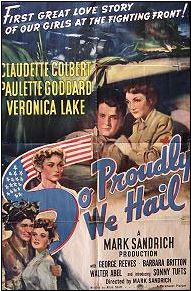
So Proudly We Hail! is a 1943 American war film directed and produced by Mark Sandrich and starring Claudette Colbert, Paulette Goddard – who was nominated for an Academy Award for Best Supporting Actress for her performance – and Veronica Lake. Also featuring George Reeves, it was produced and released by Paramount Pictures.
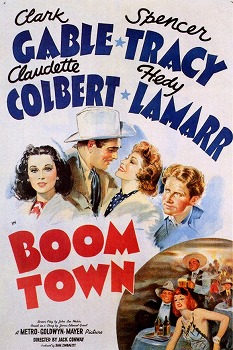
Boom Town is a 1940 American Western film starring Clark Gable, Spencer Tracy, Claudette Colbert, and Hedy Lamarr, and directed by Jack Conway. The supporting cast features Frank Morgan, Lionel Atwill, and Chill Wills. A story written by James Edward Grant in Cosmopolitan magazine entitled "A Lady Comes to Burkburnett" provided the inspiration for the film. The film was produced and released by Metro-Goldwyn-Mayer.

The Palm Beach Story is a 1942 screwball comedy film written and directed by Preston Sturges, and starring Claudette Colbert, Joel McCrea, Mary Astor and Rudy Vallée. Victor Young contributed the musical score, including a fast-paced variation of the William Tell Overture for the opening scenes. Typical of a Sturges film, the pacing and dialogue of The Palm Beach Story are very fast. The film was distributed by Paramount Pictures.
Norman Krasna was an American screenwriter, playwright, producer, and film director who penned screwball comedies centered on a case of mistaken identity. Krasna directed three films during a forty-year career in Hollywood. He garnered four Academy Award screenwriting nominations, winning once for 1943's Princess O'Rourke, which he also directed.

Hands Across the Table is a 1935 American romantic screwball comedy film directed by Mitchell Leisen and released by Paramount Pictures. It stars Carole Lombard as a manicurist looking for a rich husband and Fred MacMurray as a poor playboy, with Ralph Bellamy as a wealthy ex-pilot in a wheelchair. The teaming of Lombard and MacMurray was so well received, they went on to make three more films together, The Princess Comes Across (1936), Swing High, Swing Low (1937), and True Confession (1937).

Mark Sandrich was an American film director, writer, and producer.

Cecil Lauriston Kellaway was a South African character actor. He was nominated for the Academy Award for Best Supporting Actor twice, for The Luck of the Irish (1948) and Guess Who's Coming to Dinner (1967).
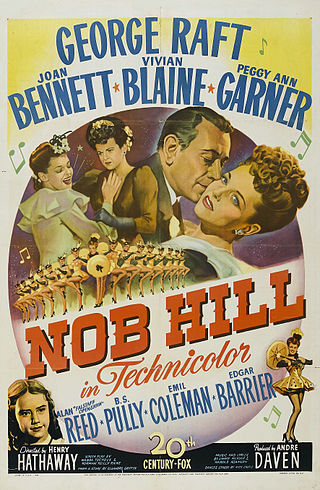
Nob Hill is a 1945 Technicolor film about a Barbary Coast, San Francisco, United States saloon keeper, starring George Raft and Joan Bennett. Part musical and part drama, the movie was directed by Henry Hathaway. It remains one of Raft's lesser known movies even though it was a big success, in part because it was a musical.
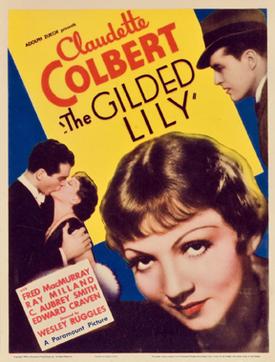
The Gilded Lily is a 1935 American romantic comedy film directed by Wesley Ruggles and starring Claudette Colbert, Fred MacMurray, Ray Milland, and C. Aubrey Smith. The production's screenplay, written by Claude Binyon, is about a stenographer who becomes a famous café entertainer courted by an English aristocrat and an American newspaper reporter. Released by Paramount Pictures in the United States on January 25, 1935, the film is one of the English language films chosen by the National Board of Review for its top-10 list of 1935. The Gilded Lily is also the first of seven films in which Claudette Colbert and Fred MacMurray costar.

Arise, My Love is a 1940 American romantic comedy film directed by Mitchell Leisen and starring Claudette Colbert, Ray Milland and Dennis O'Keefe. It was made by Paramount Pictures and written by Billy Wilder, Charles Brackett and Jacques Théry. Containing an interventionist message, it tells the love story of a pilot and a journalist who meet in the latter days of the Spanish Civil War and follows them through the early days of World War II. Colbert once said that Arise, My Love was her personal favorite motion picture of all the films she had made.
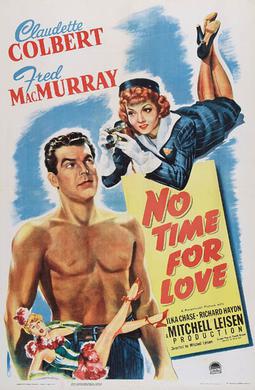
No Time for Love is a 1943 American romantic comedy film produced and directed by Mitchell Leisen and starring Claudette Colbert and Fred MacMurray. Written by Claude Binyon, Robert Lees, and Frederic I. Rinaldo, the film is about a sophisticated female photographer assigned to photograph the tough "sandhog" construction workers at a tunnel project site. After saving one of the sandhogs from a fatal accident, she becomes attracted to this cocky well-built man they call Superman. Unsettled by her feelings, she hires the man as her assistant, believing that her attraction to him will diminish if she spends time with him. Their time together, however, leads to feelings of love, and she struggles to overcome her haughtiness and make her true feelings known.
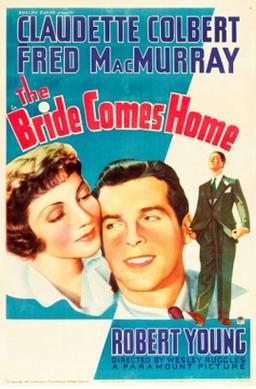
The Bride Comes Home is a 1935 comedy film made by Paramount Pictures, directed by Wesley Ruggles, and starring Claudette Colbert, Fred MacMurray and Robert Young. It was written by Claude Binyon and Elisabeth Sanxay Holding.

Princess O'Rourke is a 1943 American romantic comedy film directed and written by Norman Krasna, and starring Olivia de Havilland, Robert Cummings and Charles Coburn. Krasna won the 1944 Oscar for Best Original Screenplay.
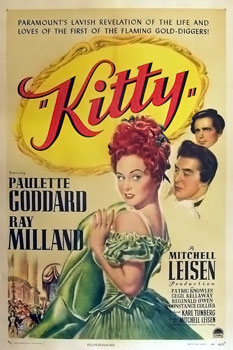
Kitty is a 1945 film, a costume drama set in London during the 1780s, directed by Mitchell Leisen, based on the novel of the same name by Rosamond Marshall. The screenplay is by Karl Tunberg. It stars Paulette Goddard, Ray Milland, Constance Collier, Patric Knowles, Reginald Owen, and Cecil Kellaway as the English painter Thomas Gainsborough.
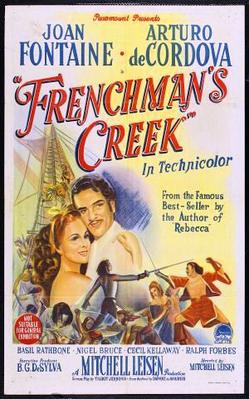
Frenchman's Creek is a 1944 adventure film adaptation of Daphne du Maurier's 1941 novel of the same name, about an aristocratic English woman who falls in love with a French pirate. The film was released by Paramount Pictures and starred Joan Fontaine, Arturo de Córdova, Basil Rathbone, Cecil Kellaway, and Nigel Bruce. Filmed in Technicolor, it was directed by Mitchell Leisen. The musical score was by Victor Young, who incorporated the main theme of French composer Claude Debussy's Clair de Lune as the love theme for the film.
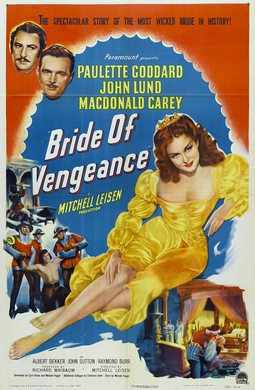
Bride of Vengeance is a 1949 American historical drama film directed by Mitchell Leisen and starring Paulette Goddard, John Lund and Macdonald Carey. Produced and distributed by Paramount Pictures, it is set in the Italian Renaissance era. Ray Milland was originally cast in the film but refused the assignment, leading the studio to suspend him for ten weeks.

Are Husbands Necessary? is a 1942 American comedy film directed by Norman Taurog and starring Ray Milland and Betty Field. It follows the misadventures of a wacky wife and her sometimes exasperated, but loving, banker husband. The film's screenplay was adapted by the husband-and-wife writing team of Tess Slesinger and Frank Davis, from the novel Mr. and Mrs. Cugat, the Record of a Happy Marriage by Isabel Scott Rorick. This novel would later be a source for the related 1948 radio series My Favorite Husband starring Lucille Ball, which itself would evolve into the television series I Love Lucy.
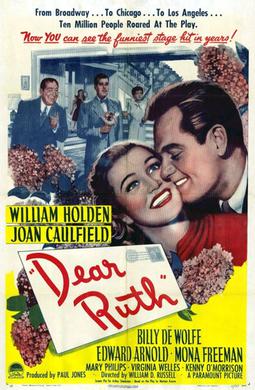
Dear Ruth is a 1947 American romantic comedy film starring Joan Caulfield, William Holden, Mona Freeman, Billy De Wolfe and Edward Arnold. It was based on the 1944 Broadway play of the same name by Norman Krasna.


















